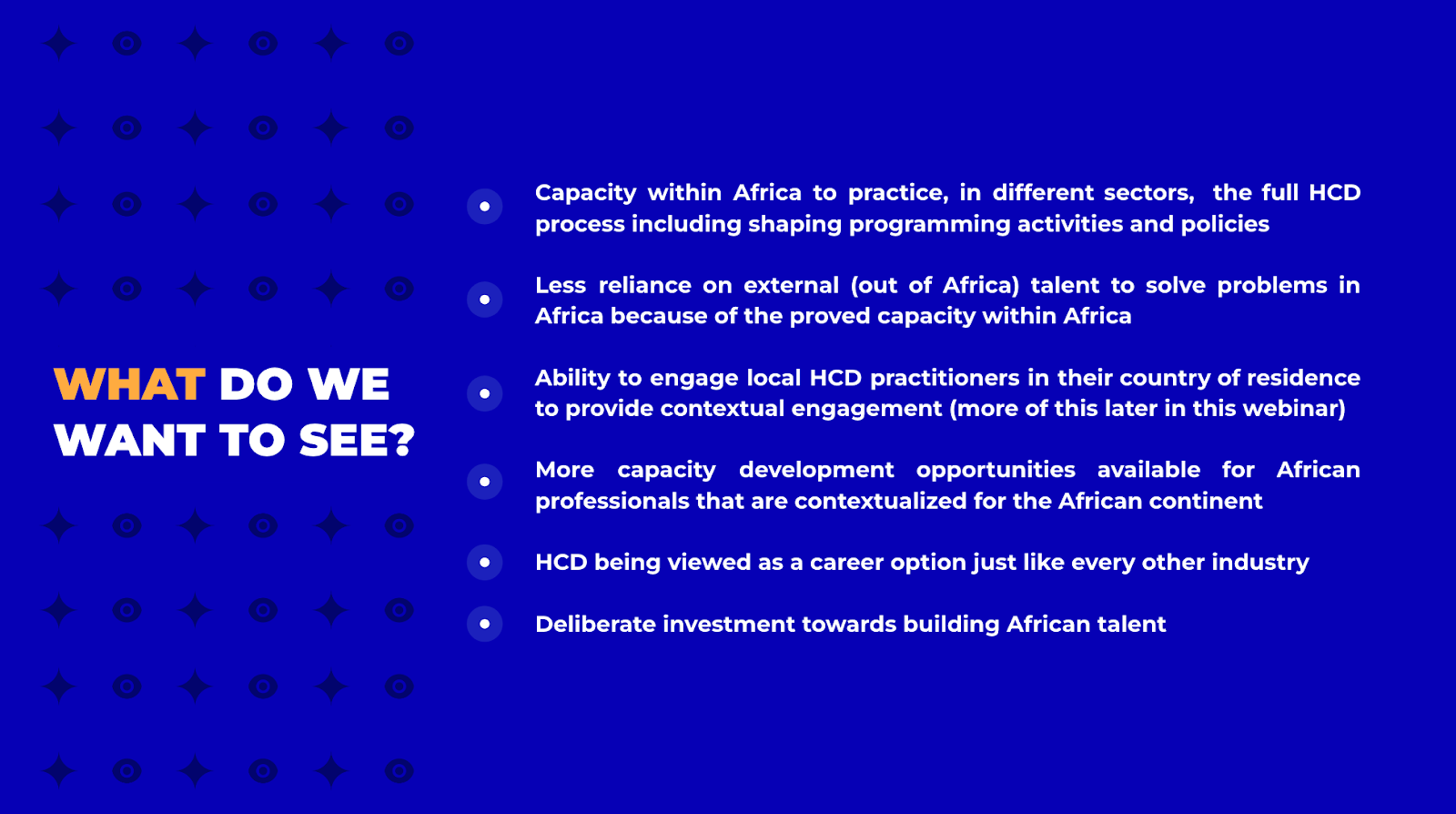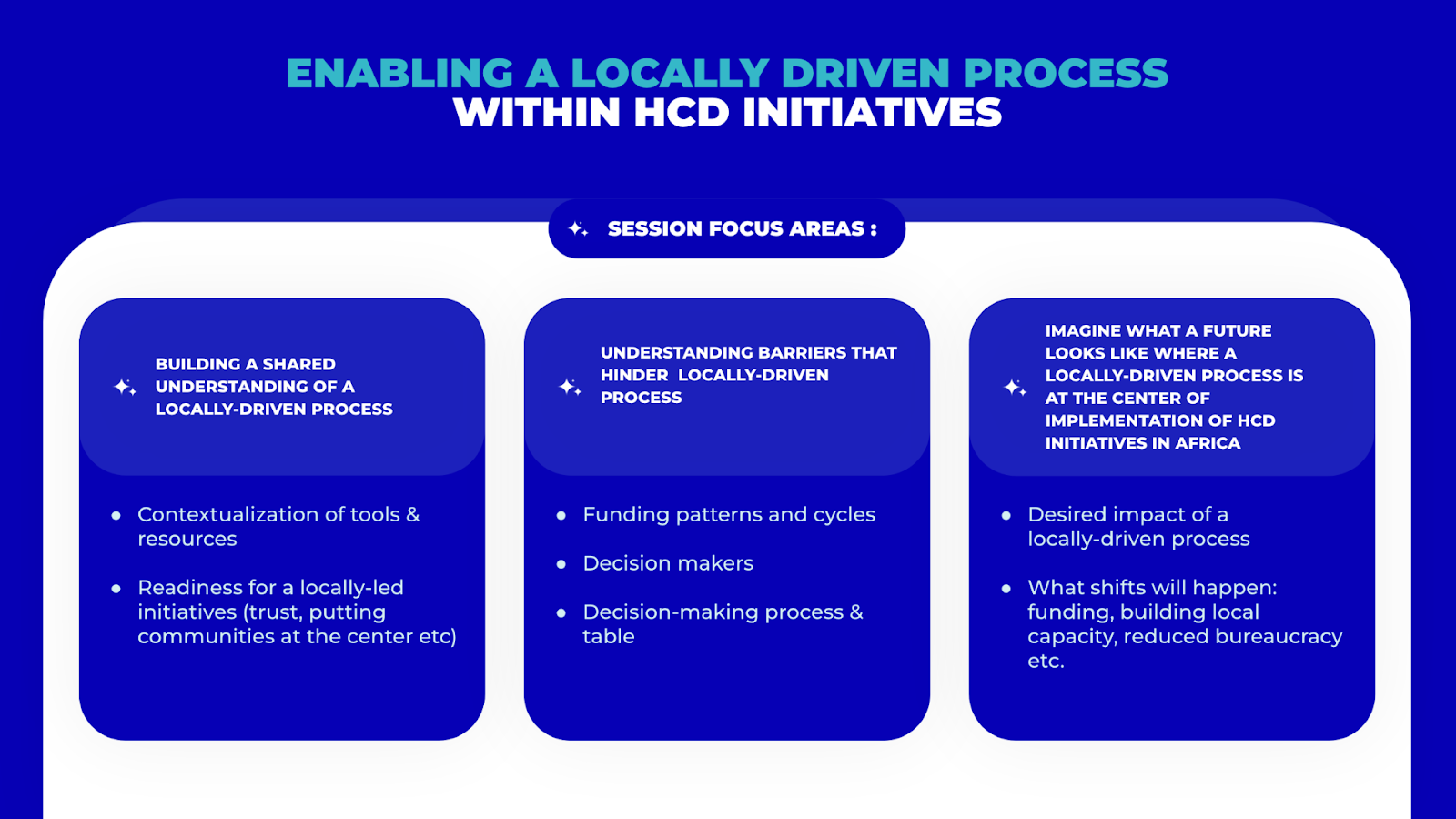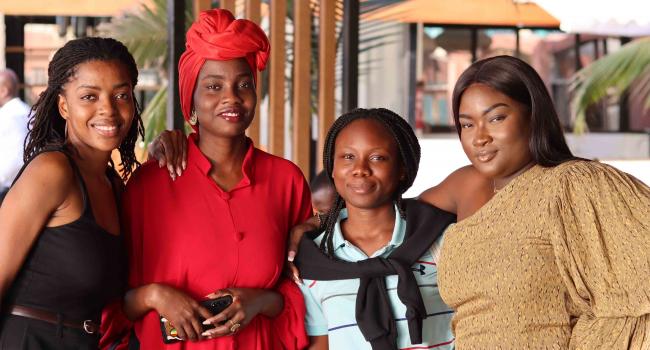On Tuesday 20th February we hosted our first live exchange webinar, moderated by Liz Royea (McNeil), Senior Community Manager at HCDExchange, to dig into and reflect on themes from the State of HCD in Africa 2023 study.
Main Takeaways
- There is no linear path to get into the HCD field, prompting the question about how to best prepare aspiring HCD practitioners for success.
- Some of the gaps in skill sets amongst most HCD practitioners within the African context include: translating HCD insights into programming activities, cultural sensitivity, advocacy and more.
- The future of HCD capacity building should be one that involves a deliberate investment towards building African talent and less reliance on external talent.
- A systems-level approach is required to address the barriers to locally driven HCD, which include: lack of awareness of HCD, power dynamics, and limited capacity building resources, and a systems level approach is required to address
- Skills-building paired with reshaping decision-making power is a critical enabler to accelerating the progress on application of locally-driven HCD and the realization of meaningful impact
Oluchi and Rajay kicked off the webinar with a little context about the study’s motivation, process, methodology, and initial findings around who is doing HCD and where practitioners on the continent are doing it (by geography and sector). All of these details can be found in our report.
We then handed over to our guest speakers, Munya and Wanja, highly experienced HCD practitioners who each selected a theme from the report to reflect on and engage the audience to generate ideas around identified opportunities. In the sections below we summarize their reflections and the ideas that arose from the brainstorming exercises alongside their chosen themes: Capacity Building in HCD, and Enabling a Locally-Driven Process within HCD Initiatives.
Theme 1: Capacity Building in HCD
Munya highlighted that there is no linear path to entering the HCD field, as demonstrated by the study. While about 40% of HCD practitioners indicated that they were formally trained in design, we also see a lot of consultants who stumbled into the design field by chance, as Munya illustrated with his own initiation to the HCD field, where he was trained through a design sprint that he found randomly on social media. This observation brings up a number of questions and challenges around what’s required to adequately and intentionally prepare aspiring HCD practitioners for success.
Because there’s no linear way of developing HCD capacity, Munya observed that there are gaps being noticed by fellow HCD practitioners within their own skill sets and those that they work with. These include, translating HCD insights into programming activities, cultural sensitivity to be truly empathetic, research skills (highlighted in the study) and many more.
Munya then continued to explain that with this non-linear nature of learning HCD in Africa, one will notice that not every HCD practitioner will have the same area of expertise, which is normal in any profession.
“But how do we ensure that those interested in expanding their skillsets are able to do so with clear steps? How do we ensure we build capacity within teams, organizations, countries and regions to have an arsenal of skills that fit the problems being addressed through HCD?”
Ultimately, Munya emphasized that we need a holistic approach to African professional development which prioritizes not only technical skills but also skills such as translating insights and solutions into programming activities, cultural sensitivity and many more. Finally, Munya shared his vision of what we want to see, shown in the image below:

We then had an interactive moment with the audience where we brainstormed ideas to the question: How Might We Reimagine HCD Capacity Development in Africa to Enhance African Design Talent? Below are some of the ideas that came out:
- Working with universities to ensure that this skill is built from the university level but we can even go below that to the high school level
- Training in local languages & localizing the language of HCD
- Integration of cultural sensitivity into trainings
- Policy changes to ensure that African talent is represented in projects within Africa
- Focus on building networks across the continent which include space for well-established individuals as well as new people
- Sharing local case studies
- More events (conferences, hackathons, design sprints)
- Structured mentorship programmes
Theme 2: Enabling a Locally-Driven Process within HCD Initiatives
Wanja’s conversation covered three broad areas:
- Building a shared understanding of a locally-driven process in HCD initiatives
- Understanding barriers that need to be overcome to achieve a locally-driven process in HCD initiatives
- Imagining together what the future of HCD in Africa looks like if we had a locally-driven process at the center of implementation of HCD initiatives in Africa.

Wanja began her talk by illustrating the fact that while HCD has been in the continent for quite some time now, there are still some elements of it which makes it feel foreign. For instance, most HCD resources are predominantly in English and bring terminologies that are not easily transferable to other languages. As a result, there has been an uneven adoption of HCD across the continent, with anglophone countries seeing greater funding towards HCD projects. This foreignness has also led to many practitioners breaking down the HCD process into fewer steps and simpler chunks to make it consumable for those taking part in capacity building activities in various countries. Reflecting on this, Wanja asked:
‘Are there risks to this when people pick what makes sense and leave out other more complicated aspects, and what opportunities are there in capacity building to ensure that participants can derive the full meaning of HCD?’
As we speak about enabling a locally-driven process, Wanja urged us to reflect about whether existing structures are enabling or hindering authentic application of Human-Centered design. For instance, HCD has commonly been positioned as a silver-bullet that can tackle all types of complex problems and this can sometimes create a tension between design agencies and clients in terms of the expectations of what the process can achieve. What hasn’t been as widely spoken about is what are the right conditions that are required to realize the full-potential of HCD processes in tackling complex challenges. For instance, the tension between a need to show results early in traditional project cycles vs going through the motions of the HCD process has been a point of tension between project implementers and designers.
In the report, the 3 main barriers to a locally-driven HCD process that emerged include:
- Lack of awareness of HCD processes at the local level
- Power dynamics and hierarchies within organizations
- Limited resources for capacity building at the local level
Wanja observed a pattern and intersection in the top 3 barriers highlighted, pointing out that addressing one of these barriers might not necessarily be the only solution required but rather looking at this from a systems level; from the role of awareness in building buy in to availing resources to strengthen local capacity and ultimately ensuring that trust and decision-making power around resource allocation is given to people who are closest to the problem being tackled.
When asking the question, ‘Are we really ready for a more locally-driven process?’ Wanja explained that it is clear that there’s a big disconnect between decision makers and those applying HCD in Africa and this came out as an area that needs relooking for HCD initiatives to be successful. Skills paired with reshaping decision-making power is a critical enabler to accelerating the progress on application of HCD and realization of meaningful impact.
“If you can’t get a seat at the table, create a new table”
Wanja then invited us to brainstorm on the following question: How Might We Shift Existing Structures to Enable a More Locally Driven Process Within HCD Initiatives?
The following ideas from the audience stood out:
- Upstream influence - pushing back to clients and donors if expectations or decisions do not take into account local voices
- Shifting funding for HCD from foreign to local donors
- Training local governments on the process and its benefits
- Creating a community of practice that enables people to see that local abilities are available
- Sharing HCD success stories and lessons learned
- Shift from centralized design hubs to decentralized models. Establish community-based design hubs that act as centers for innovation, education, and collaboration
- Shift the focus from global metrics to locally relevant indicators when measuring the impact of HCD initiatives
- Designing investment cases for HCD-based grants/funding towards regional development projects
- Reframing the word HCD and replacing it with a term that can resonate best with the African context.
- Sharing leadership on a project with a local designer
Conclusion
We were so glad to see the level of enthusiasm from our audience to engage with these topics that are so important to create positive futures in the complex and diverse African HCD landscape, and a massive shout out to our event partners and representatives from HCDExchange and ThinkPlace Kenya, who made this the incredible exchange that it was.
We invite you to continue the conversations sparked from this webinar online. What do you think is important to consider, and what ideas do you have, when looking at capacity building and locally-driven projects in the context of HCD in Africa? What experiences have you had around the challenges and opportunities raised around these topics?
Reach out to our study co-leads, Rajay (rajay@yux.design) and Oluchi (oluchi@yux.design) if you would like to collaborate with us in taking these conversations forward.



